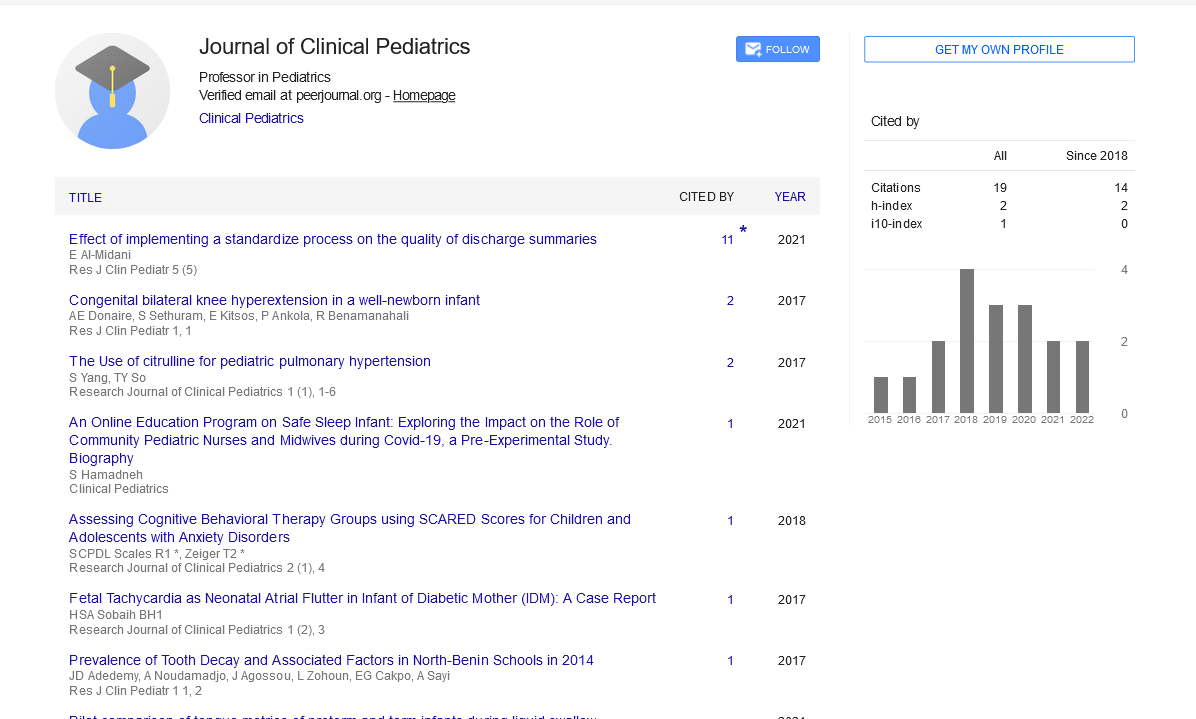Perspective, Res J Clin Pediatr Vol: 7 Issue: 2
Paediatric Dermatology's Importance: Improving Children's Skin Health
David Christine*
Department of Pediatric and Adolescent Gynecology, University Avenue, Toronto, Canada
*Corresponding Author: David Christine
Department of Pediatric and Adolescent
Gynecology, University Avenue, Toronto,
Canada E-mail: david_christine@ua44.ca
Received date: 22 May, 2023, Manuscript No. RJCP-23-105508;
Editor assigned date: 25 May, 2023, PreQC No. RJCP-23-105508 (PQ);
Reviewed date: 08 June, 2023, QC No. RJCP-23-105508;
Revised date: 15 June, 2023, Manuscript No. RJCP-23-105508 (R);
Published date: 22 June, 2023, DOI: 10.4172/Rjcp.1000146
Citation: Christine D (2023) Pediatric Dermatology's Importance: Improving Children's Skin Health. Res J Clin Pediatr 7:2.
Description
Pediatric dermatology plays a vital role in safeguarding and enhancing the skin health of children. The skin is the body's largest organ and serves as a protective barrier against external factors. However, children's skin is unique and requires specialized care due to its delicate nature and increased vulnerability to various dermatological conditions. Pediatric dermatologists are trained to identify and manage a wide range of skin conditions that affect children, including eczema, acne, birthmarks, psoriasis, infections, and allergic reactions. Early diagnosis is important as it allows for timely intervention, prevents the progression of conditions, and minimizes potential complications.
By accurately diagnosing skin disorders, pediatric dermatologists can develop tailored treatment plans to address specific needs. This may include topical medications, oral medications, phototherapy, or procedural interventions, depending on the condition. Prompt and appropriate treatment not only relieves symptoms but also promotes faster healing, improves comfort, and enhances the child's overall quality of life.
Some children may develop chronic skin conditions that require ongoing care and management. Conditions like atopic dermatitis (eczema), psoriasis, and vitiligo can significantly impact a child's physical and emotional well-being. Pediatric dermatologists work closely with patients and their families to develop comprehensive management strategies that address both the medical aspects and the psychosocial impact of these conditions.
This multidisciplinary approach may involve lifestyle modifications, skin care routines, counseling, and education about triggers and flare-up management. By empowering families with knowledge and resources, pediatric dermatologists help children and their caregivers better navigate the challenges associated with chronic skin conditions, promoting better disease control and improved quality of life.
Skin disorders can have a profound psychological impact on children, affecting their self-esteem, body image, and social interactions. Pediatric dermatologists recognize the importance of addressing these emotional aspects alongside medical treatment. They provide empathy, support, and guidance to help children cope with the psychosocial challenges that often accompany dermatological conditions.
Additionally, pediatric dermatologists may interact with psychologists, social workers, or support groups to provide comprehensive care and facilitate a holistic approach to addressing the emotional well-being of children and their families. By addressing both the physical and psychological aspects, it plays an important role in promoting the overall mental health and self-confidence of young patients.
Pediatric dermatology goes beyond diagnosing and treating existing skin conditions, it also focuses on prevention and education. Dermatologists educate parents, carers, and children about proper skin care practices, sun protection, and the identification of potential skin irritants or allergens. Promoting sun-safe behaviors, such as regular sunscreen use, protective clothing, and seeking shade, reduces the risk of sunburn and skin cancer in later years. Pediatric dermatology significantly impacts the psychological and emotional well-being of children. It understands the psychosocial effects of skin disorders and provides empathetic care, counseling, and support to address the emotional aspects of these conditions.
Furthermore, pediatric dermatologists play a vital role in identifying and managing childhood skin conditions that may have long-term implications. Early detection and intervention not only prevent immediate discomfort but also reduce the risk of persistent or recurrent skin issues in adulthood.
Conclusion
Pediatric dermatology plays a key role in enhancing the skin health of children. By providing early diagnosis, effective treatment, and preventive care, pediatric dermatologists contribute to improving the overall well-being of young patients. Their expertise not only addresses the physical manifestations of skin conditions but also acknowledges and addresses their emotional and psychological impact. Through education and support, pediatric dermatologists empower children and their families to take control of their skin health, fostering confidence and promoting a lifetime of healthy skin.
 Spanish
Spanish  Chinese
Chinese  Russian
Russian  German
German  French
French  Japanese
Japanese  Portuguese
Portuguese  Hindi
Hindi 
